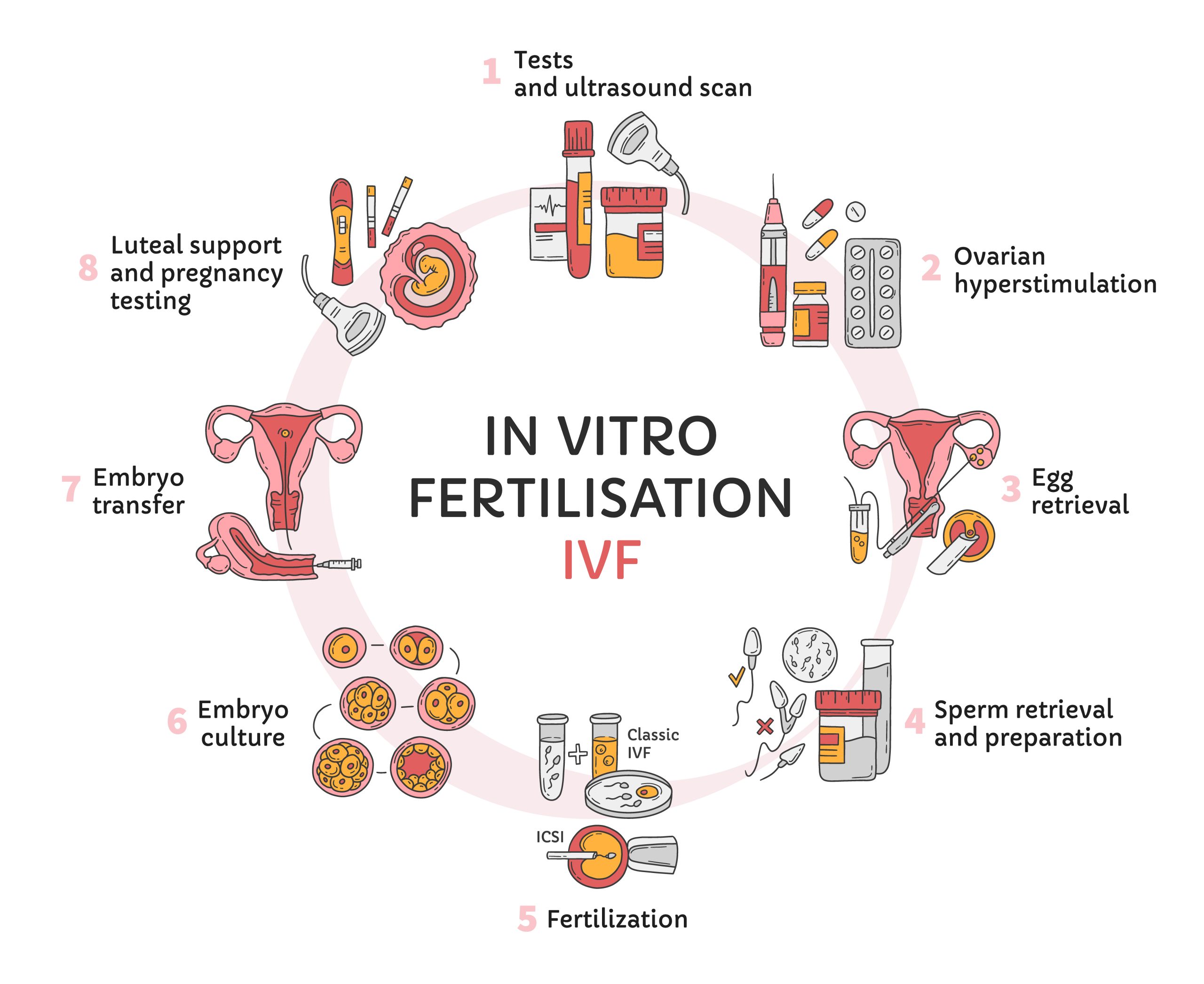IVF Treatment in Pune Delivered with Care, Expertise & Personal Touch
IVF (In Vitro Fertilization), used for female infertility and unexplained infertility, is a form of assisted reproductive treatment (ART) in which eggs are fertilized with sperm outside the body. IVF can be carried out using a couple’s own eggs and sperm or eggs and sperm from donors. It has been a light at the end of the tunnel for millions of people to overcome fertility issues.
IVF involves the fertilization of an egg with sperm in a laboratory dish and transferring the embryo (the fertilized egg) into the uterus. In other words, IVF allows individuals and couples to have children at a later time.
Highly experienced specialists
Modern Infrastructure
MOdern High-tech Equipment
Advanced NICU Availability
Personalized Care
NO-cost EMI Available
When is IVF Recommended?

IVF is done to help a woman become pregnant. Age, health conditions, and alcohol use can cause difficulty in conceiving, while some couples may experience unexplained infertility where tests may not reveal any obvious reason for infertility.
But how is it determined if IVF is right for you? IVF can be used to treat infertility if you or your partner has:
- Fallopian tube damage/blockage: Damaged or blocked tubes make it hard for an egg to be fertilized or for an embryo to travel to the uterus.
- Reduced Sperm count: A low number of sperm or poor sperm motility may make it difficult for sperm to fertilize an egg. A visit to a specialist for an IVF treatment in Pune may be required to find a treatable option.
- Ovulation disorders : IVF can be the way for women with ovulation disorders or conditions, such as polycystic ovary syndrome (PCOS), to help regulate or stimulate ovulation.
- Endometriosis: IVF may be recommended for women with endometriosis, which often affects the uterus, ovaries and fallopian tubes.
- Uterine tumors: Women with uterine fibroids or other benign uterine tumors may benefit from IVF.
- Poor egg quality: IVF can do wonders using donor eggs or an intracytoplasmic sperm injection (ICSI) technique to overcome problems related to poor eggs.
- Age-related infertility: Women in their 30s and early 40s can seek IVF for a high chance of success.
- Unexplained infertility: IVF may be an option when tests cannot find the reason for someone’s infertility.
If you are in a quest for the best IVF treatment in Pune, we encourage you to take the first step toward realizing your dream of becoming a parent by speaking with the top-rated fertility specialists at Benecare in Baner, Pune.
Benecare offers unrivaled pregnancy assistance, comprehensive prenatal care, breastfeeding guidance, and the best postpartum care for moms with finesse, personal touch and dignity. We ensure a healthy and joyous journey throughout pregnancy and the postpartum phase to fulfill a family unit with the best and low cost IVF treatment in Pune.
Process of IVF treatment
Consultation & Evaluation
The first step to start your IVF journey is to talk to a fertility specialist at the best IVF treatment in Pune—Benecare. The process starts with a review of your medical history and includes a comprehensive fertility evaluation. The assessment generally includes physical examinations, blood tests, ultrasounds, and other diagnostic procedures to identify any underlying issues that may dent the success of the IVF treatment and evaluate your reproductive health.
Ovarian Stimulation
The next stage in the IVF process is referred to as ovarian stimulation or controlled ovarian stimulation (COS). To stimulate the ovaries and encourage the growth of multiple mature eggs, you will receive a prescription for fertility medications, usually in the form of injectables. The medication protocol will be personalized to suit your individual requirements and closely monitored through regular ultrasound scans and hormone level assessments to ensure optimal results.
Egg Retrieval
Before egg retrieval, you will be given medicine to keep you from feeling pain and help you relax. Once the eggs have reached the desired level of maturity, a scheduled egg retrieval procedure is conducted. This procedure generally takes place with the guidance of ultrasound and under light anesthesia.
A thin needle is inserted through the vaginal wall into the ovaries, and the follicular fluid containing the eggs is gently aspirated. The procedure typically lasts about 20 minutes, after which the eggs are carefully transferred to the embryology laboratory. Eggs that appear mature and healthy will be mixed with sperm to attempt to create embryos. After the procedure, you may have cramping and feelings of pressure or fullness.
Sperm Collection
Generally, on the same day as the egg retrieval, a fresh semen sample is obtained from your spouse to proceed with the egg harvest. However, a previously frozen sample can be used if it is difficult to collect a fresh sample or if your spouse is unavailable on that day. The sperm and eggs will then be combined in a petri dish by a skilled and experienced technician.
Fertilization
Conventional IVF and Intracytoplasmic Sperm Injection (ICSI) are the two primary methods of fertilization used in IVF. Conventional IVF involves combining the retrieved eggs and collected sperm in a culture dish to allow natural fertilization. Meanwhile, ICSI may be recommended if the quality of the sperm sample is not good enough to do IVF or if there is a male infertility issue. This procedure involves injecting live sperm directly into each mature egg to facilitate fertilization.
Embryo Development & Monitoring
Your embryo must prevail over hurdles to become an embryo suitable for transfer to your uterus. Only 50% (on average) of fertilized embryos advance to the blastocyst stage, an ideal stage for transfer to your uterus. Embryos suitable for transfer will be frozen on the fifth- or sixth-day post-fertilization for future embryo transfers.
Genetic Testing (Optional)
Preimplantation genetic testing (PGT) identifies genetic abnormalities (in embryos) created with IVF. It involves the biopsy of one or a few cells from each embryo for genetic testing. Embryos predicted to be free of chromosomal abnormalities or specific genetic conditions are selected. The test will provide you with the opportunity to minimize the chance of a genetic disease in your future children before pregnancy.
Embryo Transfer
The most appropriate embryos are chosen for transfer based on their quality, the quantity of available embryos, and individual circumstances. Embryo transfer generally does not require anesthesia. A thin catheter housing the embryos is delicately inserted through the cervix into the uterus. Subsequently, the embryos are gently released into the uterine cavity.
Pregnancy Test
Once the embryos have been transferred into the womb, you will be recommended to take a brief period of rest before resuming regular activities. A pregnancy test is typically conducted after around two weeks to find out if the treatment has worked. If you do become pregnant, further monitoring and assistance will be provided to check if things are progressing as expected.
Successful IVF CASES
Successful IUI CASES
Happy Couples
Top Rated Specialists
Our top-rated doctors are committed to providing personalized care and building strong relationships with their patients to achieve optimal health and wellness.

Dr. Charushila Borole Palwade
IVF specialist
MBBS, MS (Obstetrics Gynecology, Dip in IVF )

Dr. Jaideep Palwade
Obstetrics & Gynaecology
MBBS, MS (Obstetrics Gynecology ), Dip in Endoscopy
Need to consult an IVF/Fertility Expert?
Call us now or book an appointment today

Fertility & IVF Related FAQs
How does IVF work?
IVF is a treatment for infertility that involves the handling of eggs or embryos and sperm. The fertility treatment includes retrieving eggs from ovaries and fertilizing an egg with sperm in a laboratory dish. The embryo is placed inside a uterus several days after fertilization.
What is the age limit for IVF treatment?
According to Section 21(g) of Assisted Reproductive Technology (ART) Act, 2021, the prescribed age limit for women is between 21 and 50 years, while for men, it is between 21 and 55 years.
What is the Success rate of IVF?
The success rate of IVF is approximately 30-40% per cycle on average.
How many cycles of IVF are healthy?
To date, there is no yardstick on the number of IVF cycles that are regarded as healthy or apt for everyone.
